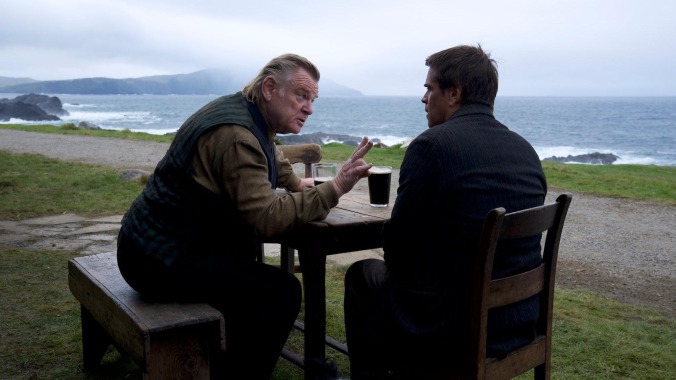The Banshees Of Inisherin is a reflective, melancholic masterpiece
Colin Farrell, Brendan Gleeson and a sweet mini donkey will slyly break your heart in Martin McDonagh's best film to date

Friendship breakups, at least those between longtime pals, hurt like hell. They burn your spirit and leave you displaced, sometimes just as harshly as the end of a romance can. In The Banshees Of Inisherin, Pádraic has been deeply feeling this ache, strolling around his (fictional) island of Inisherin perplexed and in denial alongside Jenny, his loyal donkey companion. Writer-director Martin McDonagh’s soulful masterpiece offers a a windswept elegy on a camaraderie that has reached its inexplicable expiration, as well as melancholic rumination on mortality.
Played by an ever-expressive, career-best Colin Farrell, whose heartrendingly boyish, puppy-dog face and perennially saddened eyebrows redefine the meaning of expressive, Pádraic can’t figure out why his lifelong buddy Colm (a terrific, poetically anguished Brendan Gleeson), “just don’t like him no more.”
Set in the early 1920s on a small island’s imposing shores opposite mainland Ireland, distant explosions constantly remind the Inisherin locals of a civil war on their country’s soil. But to Pádraic, the combat into which he and his immediate community has involuntarily been pulled is the only battle that matters in the universe. The comparably more cultured Colm acts so doggedly dismissive of him that his buddy’s abrupt rejection leaves the uneducated but decent-hearted Pádraic helpless as a bird with broken wings, one that tries to take flight even when the circumstances suggest he’d better stay put for a while.
Everyone, including Pádraic’s worldly sister Siobhan (a gracefully affecting Kerry Cordon), who herself dreams of a better life elsewhere, asks him: Have you been rowing? But how the feck is Pádraic supposed to know? The best thing he figures he can do is to make continuous attempts to fix what he doesn’t comprehend is broken, a persistence that disastrously backfires on Colm, who’s been going through an emotional crisis of depression with his loyal dog at his side. His time left on this earth is rapidly vanishing, Colm feels. And he has nothing of substance to show for himself apart from an escalating sense of despair, which he only confesses to his local priest. Perhaps the gifted musician should focus more on his fiddling and compositions, or find some other hopeful or productive thing to do; anything that doesn’t waste his precious little time on mindless banter with Pádraic.
As unapologetically idiosyncratic and memorable as McDonagh’s heightened genre bender Three Billboards Outside Ebbing, Missouri was, the British-Irish writer and his characteristically wry sense of humor felt oddly out of place in the American context he conjured, first on the page and then the screen. Neither the grown-up fable he imagined nor the fictional town of Ebbing felt close to something truthful and authentic. In contrast—and just like he did in In Bruges—the filmmaker seems right at home at the impeccably realized Inisherin, despite a slightly on-the-nose civil war metaphor. In fact, he knows and loves this specific place so thoroughly that you can’t help but also adore its uproarious quirks and magnificently sharp-edged landscapes right from the start. In other words, McDonagh wins the audience’s complete trust so quickly that they cannot help but feel utterly shattered when he unleashes his parable’s mounting heartbreaks and delicate tragedies, and with the earned confidence of a storyteller who knows every nook and cranny of his tale inside and out.
That intimate certainty is evident in every single character, from the elegantly observed Siobhan, to an old, acerbic seer (the closest character to an actual banshee) as well as the tormented Dominic (a haunting Barry Keoghan), the abused son of a local police officer who sneakily claims one of the film’s finest scenes through a disarming—if unrequited—romantic confession. It is also palpable in the crafts—the dotingly designed rustic interiors, Ben Davis’ pastoral cinematography blessed by divine rays of light and traditional Irish countryside costumes of cozy knits and hardwearing tweeds kissed by gale and salt. Even the animals are game to elevate this flawlessly envisioned slice of earth—allow me to prophesize that you will fall madly in love with the island’s four-legged creatures, especially Colm’s concerned shepherd dog and the sweet Jenny, who wants nothing more than a peaceful snooze by the fire when Siobhan doesn’t show her out.
Considering McDonagh’s former outings, you won’t be surprised to learn that The Banshees Of Inisherin is wildly funny with laughs that break as frequently as the eponymous island’s magnificent waves. What you might find surprising is the ravaging, tearful storm that brews right beneath that humorous surface as soon as you become acutely aware of it. That storm wants to swallow you whole, spit you out and then dare to mend your broken heart somehow, right after you make peace with your own impermanence. The film convincingly argues that you must let it.